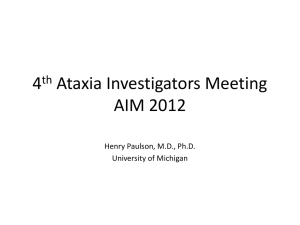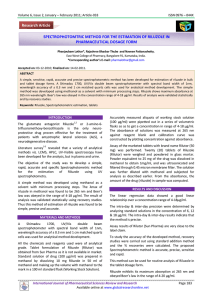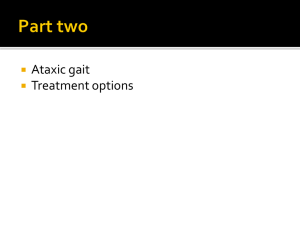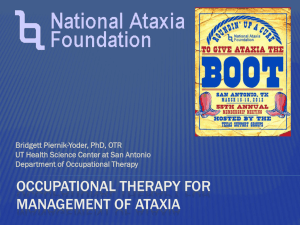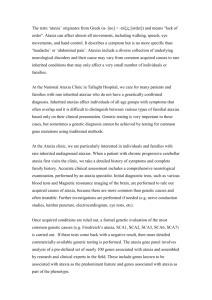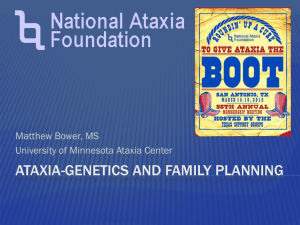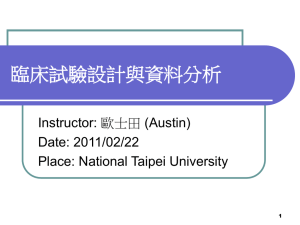Clinical Trials and Natural History Study
advertisement
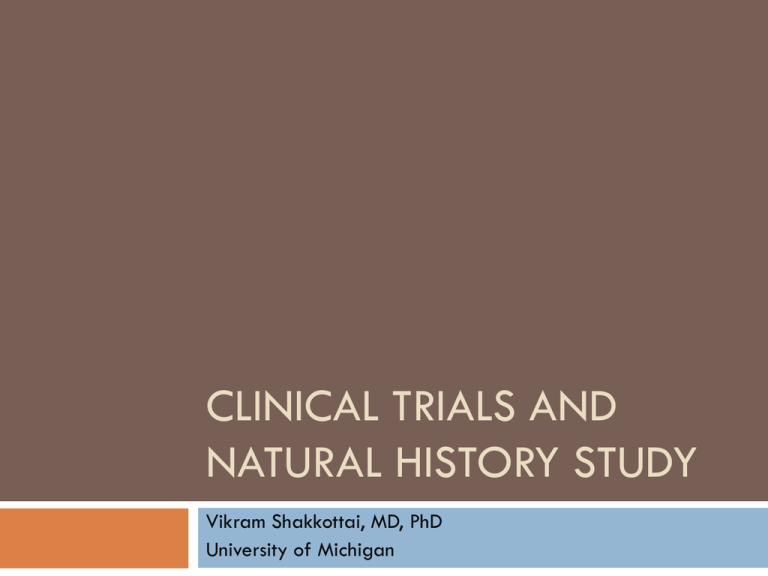
CLINICAL TRIALS AND NATURAL HISTORY STUDY Vikram Shakkottai, MD, PhD University of Michigan Ataxia trials 82 listed studies on www.clinicaltrials.gov Phase I Small group (20-100). Assess the safety, tolerability, pharmacokinetics, and pharmacodynamics of a drug Phase II Larger group (20-300). Designed to assess efficacy, as well as to continue Phase I safety assessments Phase III Randomized controlled multicenter trials on larger groups (300–3,000). Aimed at being the definitive assessment of how effective the drug is, in comparison with current 'gold standard' treatment. Sporadic ataxia Study Aim Location PI Results Riluzole Phase II S. Andrea Hospital (Italy) Giovanni Ristori Riluzole reduces ICARS score by > 5 points Coenzyme Q10 Phase I UT Galveston UF H Subramony Completed/ Unpublished Rifampicin (MSA) Phase III Multi-center Phillip Low David Robertson Sid Gilman Not yet recruiting Lithium (MSA) Phase II University Federico II (Italy) Alessandro Filla Ongoing Friedreich Ataxia Study Aim 20 studies Location PI Results Idebenone Phase III UCLA CHOP Susan Perlman David Lynch No significant alteration in neurological function at 6months (Arch Neurol. 2010 67:941-7) Deferiprone Phase II Belgium France Italy Spain Massimo Pandolfo Arnold Munnich Franco Taroni Javier Arpa Completed/ Unpublished Epoetin alfa Phase II Federico II University (Italy) Alessandro Filla Ongoing Carbamylated Erythropoietin Phase II Austria Germany Italy H. Lundbeck A/S (company) Ongoing Dominant ataxias Study Aim Location PI Results Lithium (SCA1) Phase I NIH Riluzole Phase II/III S. Andrea Hospital Silvia Romano Ongoing Varenicline (SCA3) Phase II USF UCLA Theresa Zesiewicz Ongoing Completed/ Unpublished Riluzole in ataxia In a randomized, double-blind, placebo-controlled pilot trial, 40 patients presenting with cerebellar ataxias of different etiologies were randomly assigned to riluzole (100 mg/day) or placebo for 8 weeks. Outcome measure: 5 points in the International Cooperative Ataxia Rating Scale (ICARS). The number of patients with a 5-point ICARS drop was significantly higher in the riluzole group than in the placebo group after 8 weeks (13/19 vs 1/19). The mean change in the riluzole group ICARS after treatment revealed a decrease (p < 0.001) in the total score -7.05 vs 0.16. Sporadic, mild adverse events occurred. Ristori et. Al., Neurology. 2010;74:839-45. Riluzole in ataxia Ristori et. Al., Neurology. 2010;74:839-45. Natural History Study of and Genetic Modifiers in Spinocerebellar Ataxias To establish a new multidisciplinary consortium that provides the infrastructure for future clinical trials to test safety and efficacy of therapeutic interventions for spinocerebellar ataxias. Rare Disease = # of Patient <200,000 in US Participating Sites of SCA-CRC Original Sites ( ) University of Florida: Ashizawa, Subramony UCLA: Perlman University of Chicago: Gomez Emory University: Wilmot University of Michigan: Paulson University of Minnesota: Bushara University of South Florida: Zesiewicz University of Utah: Pulst Voluntary Participants ( ) Johns Hopkins University: Ying Harvard University: Schmarmann UCSF: Kang Columbia University: Kuo/Fahn NIH, NINDS: Galpern, ORDR: Ferguson EuroSCA, Brazil, Japan Patient Support Organizations National Ataxia Foundation: S. Hagan Sparkman Fund Specific Aims of SCA-CRC Aim 1. Establish the organizational foundations for the CRCSCA Aim 2. Recruit patients, obtain longitudinal clinical data for future clinical trials, and develop novel methods for clinical trials for a small sample size. Aim 3. Initiate a pilot study to determine genetic modifiers of SCA 1, 2, 3 and 6 Aim 4. Establish a training program for cultivating physicianscientist investigators for clinical and translational research of SCA Current enrollment SARA Type of SCA N Mean age ± SD Age range Age at onset SCA1 30 48.68 ± 13.2 1-65 47.68 14.87 SCA2 31 50.06 ± 12.04 26-71 49.06 15.81 SCA3 64 51.6 ± 12.63 1-74 50.93 17.03 SCA6 45 62.9 ± 14.71 1-91 61.95 15.26 Total 170 53.8 ± 14.1 1-91 52.91 15.97 Future directions Spin-off clinical trials: Varenicline for SCA3 Lithium for SCA1 CoQ10 for SAOA Riluzole for SCAs Acknowledgements Tetsuo Ashizawa H. Subramony National Ataxia Foundation NIH 5RC1NS068897 (PI Ashizawa) Training component of the NIH 5RC1NS068897

